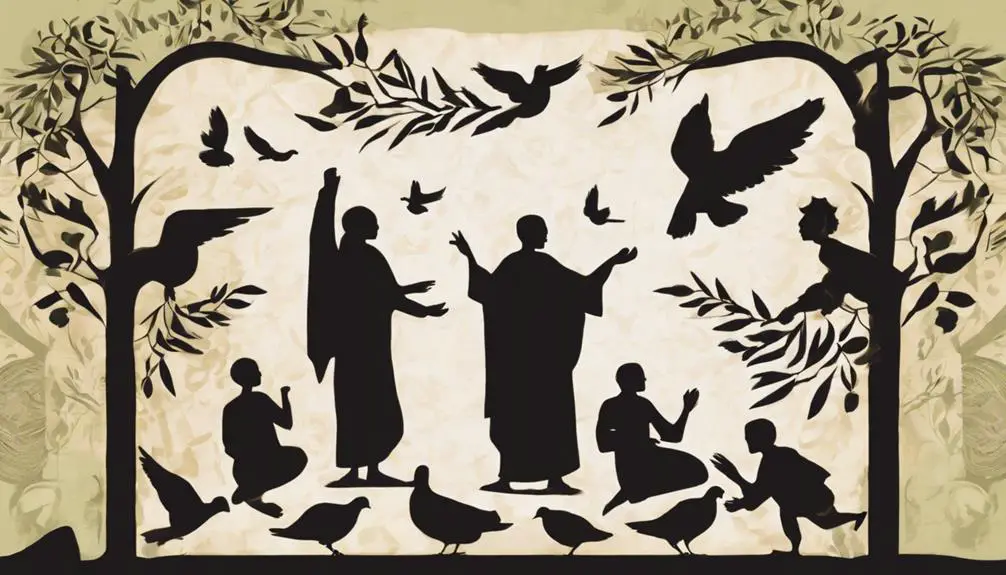The Bible's tales of promiscuity weave caution and redemption, inviting readers to explore morality's complex fabric through ancient narratives.

Promiscuous in the Bible
Just as a single thread unraveled can lead to the undoing of an entire tapestry, so too can the theme of promiscuity in the Bible unravel complex narratives and teachings.
You'll find that the Bible doesn't shy away from discussing promiscuity, embedding lessons within historical contexts and stories of redemption and forgiveness. But, it's not just about the consequences; it's also about the hope and transformation that follow.
As you explore this topic, you'll discover how ancient perspectives on promiscuity can shed light on modern interpretations and controversies, leaving you to ponder where the lines of morality and forgiveness intersect in today's world.
Key Takeaways
- The Bible views promiscuity as sinful, emphasizing chastity and fidelity within marriage.
- Cultural and historical contexts significantly influence interpretations of promiscuity in biblical texts.
- Biblical narratives include consequences of promiscuity, such as social, moral, and divine retribution, but also themes of redemption and forgiveness.
- Modern interpretations of biblical promiscuity incorporate gender discussions and cultural shifts, prompting reevaluation of historical views on promiscuity.
Defining Promiscuity Biblically

To understand promiscuity in a biblical context, it's crucial to first define what the scriptures consider as promiscuous behavior. The Bible doesn't explicitly use the modern term 'promiscuity,' but it does discuss sexual morality extensively, often emphasizing chastity and fidelity within the confines of marriage. This framework provides a basis for understanding promiscuity as engaging in sexual behaviors outside the sanctity of marital commitment, deemed sinful and morally reprehensible.
Cultural influences significantly impact the interpretation of what constitutes promiscuous behavior. In biblical times, social structures and norms varied greatly across different cultures and periods. However, the prevailing view in scriptural narratives consistently points towards a stringent sexual ethic. This ethic underscores the importance of sexual relations being reserved for marriage, a covenant relationship recognized and blessed by God.
Analyzing promiscuity through a biblical lens involves considering both the explicit commandments against adultery and fornication, and the broader principles of sexual purity. These principles aren't merely prohibitive but are reflective of a deeper understanding of human dignity and the sanctity of intimate relationships. Therefore, defining promiscuity biblically requires an appreciation of the historical and cultural context, which shapes the interpretation of sexual morality outlined in the scriptures.
Historical Contexts and Narratives

Delving into historical contexts and narratives reveals how biblical teachings on promiscuity were interpreted and applied across different cultures and epochs, reflecting the complex interplay between religious doctrine and societal norms. You'll find that interpretations were never static, adapting to the prevailing cultural norms and gender roles of the time. This adaptability underscores the malleability of religious texts when viewed through the lens of human culture.
- Cultural Norms: These significantly influenced how promiscuity was understood. In societies where lineage and purity were paramount, promiscuity was harshly condemned. Yet, in cultures with more egalitarian views, the interpretation of promiscuity was less rigid, showcasing a spectrum of acceptance.
- Gender Roles: Traditionally, gender roles played a substantial role in the perception of promiscuity. Men and women were often held to different standards, reflecting societal views on masculinity and femininity.
- Adaptation over Time: The understanding and application of biblical passages on promiscuity evolved, mirroring changes in societal norms and attitudes towards gender and sexuality.
Through this lens, it's clear that the biblical discourse on promiscuity is deeply entwined with human history, reflecting broader debates about morality, purity, and the social order.
Consequences of Promiscuous Behavior

Examining the consequences of promiscuous behavior, biblical texts often portray it as leading to various forms of social, moral, and sometimes even divine retribution. This critical perspective underscores the perceived dangers of such actions, emphasizing not only the health implications but also the harsh societal judgment that often follows. You'll find that within these ancient narratives, the repercussions aren't merely physical but deeply entwined with the fabric of community and personal integrity.
The health implications mentioned aren't to be taken lightly. While the texts don't delve into modern medical terminology, the underlying message is clear: promiscuous behavior carries risks that can affect one's physical well-being, a concern that transcends time and remains relevant today. Moreover, the societal judgment faced by individuals exhibiting such behavior is depicted as severe. This judgment isn't only from peers but often portrayed as a reflection of divine dissatisfaction, indicating a moral breach that affects one's standing within the community and with the divine.
This dual focus on health and societal judgment serves as a stern warning within the biblical context, highlighting the multifaceted consequences that can arise from promiscuous behavior.
Redemption and Forgiveness Stories

While the Bible frequently addresses the consequences of promiscuous behavior, it also offers narratives of redemption and forgiveness that highlight the possibility of moral and spiritual recovery. These stories are pivotal, showcasing that through grace and understanding, individuals can experience a graceful transformation, regardless of their past actions.
- Graceful Transformation: The Bible illustrates how individuals involved in promiscuous behaviors can undergo significant changes in character and spirit. This transformation is often depicted as a journey from guilt and shame to a renewed sense of purpose and integrity, facilitated by divine intervention and personal repentance.
- Unconditional Love: Central to these stories is the concept of unconditional love, which is portrayed as a powerful force capable of redeeming and restoring individuals back to a state of grace. This love isn't contingent on one's past but is offered freely, emphasizing the capacity for forgiveness and the endless opportunities for redemption.
- Community Restoration: The narratives also highlight the role of community in the process of healing and redemption. Acceptance and support from the community can reinforce an individual's journey towards recovery, reinforcing the idea that transformation isn't only personal but communal.
These biblical narratives underscore the themes of forgiveness, demonstrating that despite the gravity of one's past actions, redemption is always within reach, anchored in the principles of unconditional love and graceful transformation.
Modern Perspectives and Interpretations

In today's society, interpretations of biblical promiscuity vary widely, reflecting a complex interplay between traditional teachings and contemporary values. You'll find that cultural shifts significantly influence how individuals and communities understand biblical narratives around promiscuity. These shifts often challenge long-held interpretations, urging a re-examination of texts in light of modern ethical frameworks.
Moreover, gender discussions play a pivotal role in contemporary interpretations. There's a growing emphasis on analyzing biblical texts through a gender-sensitive lens, recognizing how historical contexts might've shaped perceptions of promiscuity. This approach not only highlights the gender dynamics at play but also questions the fairness and applicability of traditional interpretations in today's gender-conscious society.
As you delve into modern perspectives, you'll notice an inclination towards a more nuanced understanding of biblical promiscuity. Scholars and theologians are increasingly considering the socio-cultural contexts of biblical times and comparing them with current societal norms. This comparison sheds light on the evolution of moral standards and prompts a reevaluation of what constitutes promiscuity both historically and presently. Ultimately, this ongoing dialogue between the past and the present enriches our understanding of biblical texts, inviting a more inclusive and empathetic interpretation that aligns with today's moral and cultural complexities.
Frequently Asked Questions
How Did Different Translations of the Bible Affect the Interpretation of Promiscuity Over Time?
Different Bible translations have influenced the interpretation of promiscuity significantly. Translation methodology, closely tied to cultural context, plays a crucial role.
As you delve into various translations, you'll notice shifts in language that reflect the era's moral and societal norms. These changes can alter the perceived severity or acceptance of promiscuous behavior.
It's a fascinating study of how words shape our understanding of concepts across time and cultures.
Are There Any Biblical Figures Who Were Praised or Rewarded Despite Their Promiscuous Behavior?
When exploring figures who were celebrated despite their past actions, you'll find Rahab and Solomon notable. Rahab's legacy isn't overshadowed by her past; instead, her courage and faith are highlighted, showing a redemption arc.
Solomon's wisdom, despite his many wives and concubines, which could be seen as promiscuous by today's standards, is still praised. Their stories suggest that their contributions and faith outweighed any negative perceptions of their behavior.
How Do Various Christian Denominations Differ in Their Teachings About Promiscuity Today?
Today, you'll find that Christian denominations vary widely in their teachings on promiscuity, largely due to differing interpretations of scripture, cultural norms, and modern adaptations.
Some churches stick closely to traditional views, condemning promiscuous behavior, while others adopt a more progressive stance, focusing on love and forgiveness.
This spectrum reflects broader societal shifts and the ongoing dialogue between ancient texts and contemporary values.
What Psychological and Social Impacts Did Accusations of Promiscuity Have on Individuals in Biblical Times?
When you're accused of promiscuity, the psychological impact can be profound. You'd likely face cultural stigma, leading to social isolation and damaged personal relationships.
The legal consequences could further exacerbate your situation, possibly resulting in punitive measures or loss of social standing.
These effects not only harm your mental well-being but also disrupt your place within the community, underscoring the severe repercussions such accusations could have on an individual's life.
How Have Secular and Non-Christian Societies Historically Viewed Biblical Teachings on Promiscuity?
You're exploring how societies, especially those that are secular or non-Christian, historically interpret teachings on promiscuity. It's crucial to consider cultural relativism, understanding that perceptions vary widely.
Legal implications also play a significant role, as laws reflect societal norms and attitudes towards behavior deemed promiscuous.
Your analysis should remain objective, acknowledging the diversity of views and the influence of both cultural and legal frameworks on the interpretation of such teachings.
Conclusion
In analyzing biblical texts, it's clear that promiscuity, while contextually defined, consistently draws consequences within narratives. However, the Bible also emphasizes themes of redemption and forgiveness, showcasing a complex understanding of human behavior.
Modern interpretations continue to evolve, reflecting diverse perspectives on morality and ethics. Ultimately, these scriptures offer a nuanced view of promiscuity, encouraging a balance between recognizing moral failings and embracing the potential for forgiveness and change in one's life.



Sign up